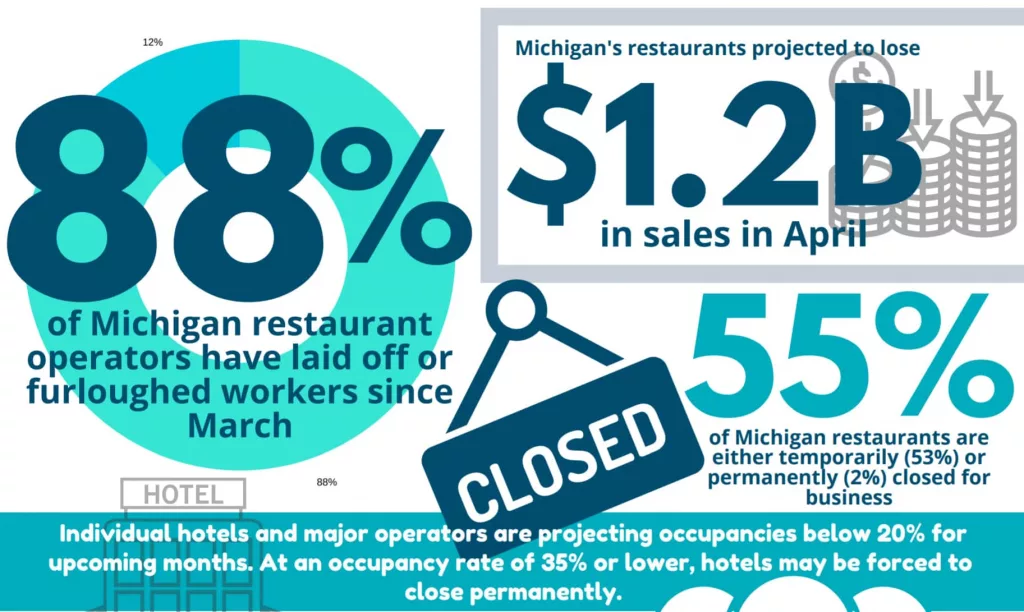Nobody is tracking the health and welfare of the Michigan hospitality industry closer or with more trepidation that Justin Winslow. As President & CEO of the Michigan Restaurant & Lodging Association — or more simply the MRLA — Winslow is increasingly worried about the trends he is tracking regarding the economic impact of the coronavirus pandemic on the industry he advocates for every day.
Winslow’s team is out with new research results tracking the economic impact of COVID-19 on the hospitality industry throughout the state. The data, which was localized to Michigan based upon surveys conducted by the National Restaurant Association and the American Hotel and Lodging Association, shows the devastating effect of the coronavirus on the livelihood of more than half of the 600,000 hospitality owners, operators, and employees in Michigan.
Winslow cautions, “The prolonged closure of Michigan’s economy, while challenging for us all, has taken a particularly heavy toll on the state’s hospitality industry, which continues to suffer untenable losses,” and worries, “The road to recovery will likely be long, as an uncertain general public awaits clarity on their safety.”
Significant survey results include the following:
- 55-percent of Michigan restaurants are either temporarily (53-percent) or permanently (2-percent) closed for business…
- 88-percent of Michigan restaurant operators have laid off or furloughed workers since the start of the coronavirus outbreak in March…
- 249,000 restaurant employees have been furloughed or laid off in Michigan…
- Michigan’s restaurants are projected to lose more than $1.2 billion in sales in April alone…
- Lodging operators have laid off or furloughed more than 87,000 workers since the start of the coronavirus outbreak in March…
- Individual hotels and major operators are projecting occupancies below 20-percent for upcoming months. At an occupancy rate of 35-percent or lower, hotels may be forced to close permanently according to the American Hotel & Lodging Association…
In direct collaboration with the National Restaurant Association (NRA) and American Hotel & Lodging Association (AHLA), the Michigan Restaurant and Lodging Association is sharing a holistic solution to secure the immediate safety and prolonged success of Michigan’s hospitality industry.
- Enact More Flexibility in the Paycheck Protection Program (PPP)
- Allow restaurants and hotels to choose an eight-week loan period that works best for them, that is at least three weeks after applicable shelter at home order is lifted.
- Revise the loan forgiveness restrictions—which currently require 75-percent of the loan to be spent on payroll—to better reflect the unique challenge of closures and travel restrictions that have particularly hampered the hospitality industry.
- Restore a ten-year loan repayment timeline for PPP as Congress intended. The two-year repayment mandate invoked by the Treasury Department further exacerbates the problem for an industry that will be slow to return to anything approaching normal sales and profitability.
- Enact the “Restaurant and Foodservice Industry Recovery Fund” (RFIRF)
- The newly conceived RFIRF is a $240 billion grant proposal that would compensate restaurants for capital and workforce expenses necessary to successfully reopen.
- Creation of a “CMBS” Market Relief Fund in the U.S. Treasury’s Main Street lending program.
- Hotel operators, from the smallest independent to larger, multi-unit operators are facing an unprecedented cash-flow crisis and as such are requesting a $10 billion bridge loan fund to be created within the “Main Street” program created by Treasury and the Federal Reserve. The financing will allow hotel operators to make debt payments and
- Tax Credits to Meet New Requirements
- When given the opportunity to fully reopen, restaurants and hotels will have little or no cash flow and significant new overhead associated with anticipated PPE requirements, increased sanitation and diminished capacity through social distancing.
- Federal Unemployment Tax Act (FUTA) Forbearance for Employers
- A policy that provides forbearance on FUTA taxes in the short-term would provide needed liquidity support for the hospitality industry.
- Enact “SNAP COVID-19 Anti-Hunger Restaurant Relief for You Act of 2020” (introduction pending Congress reconvening)
- The proposal would expand the Restaurant Meals Program (RMP) to serve everyone on the supplemental nutritional assistance program, waiving requirements to enable states to quickly and easily participate.
Comprised primarily of small operators, Michigan’s hospitality industry employs one in eight workers and produces nearly 10-percent of the state’s revenue. Tourism remains Michigan’s second largest industry. Due to COVID-19, more than half of Michigan restaurants are temporarily or permanently closed. As a result, nearly 350,000 hospitality workers have been laid off or furloughed in recent weeks.
Winslow contends, “The hospitality industry is simply too big to fail in Michigan,” adding, “Collectively, we are 18,000 private businesses that employ one in eight Michiganders and generate nearly ten-percent of the state’s revenue.” Winslow reminds, “Restaurants and hotels have been there for Michiganders, providing some of our favorite experiences and best memories. Now, in our time of need, we are calling on elected leaders on both sides of the aisle, in Lansing and in Washington D.C., to focus their energy and resources on saving this industry.”
You can see the industry’s blueprint in full at the link below:
Restaurant-Blueprint-for-Recovery
Further survey details can be found at this link:






